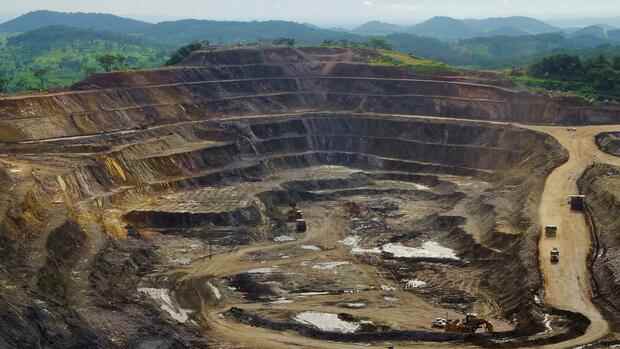Zurich At the threshold of electromobility, an African country is moving into the focus of car manufacturers: The Democratic Republic of the Congo (DRC) is the world’s largest producer of cobalt, the metal that industry so urgently needs to manufacture high-performance batteries. Although the Central African country has two-thirds of the world’s known reserves, it no longer wants to be content with the role of raw materials supplier. The government is now concerned with securing a larger part of the value added domestically.
The Industry Minister of the DRC, Julien Paluku Kahongya, said in an interview with the Handelsblatt: “We want to play a more active role in the energy transition.” The importance of the country for the battery industry must be in proportion to the importance of the raw material reserves.
Not only does the DRC have large reserves of cobalt, the country has also recently discovered deposits of nickel and lithium, Industry Minister Kahongya said. In addition, the metal manganese has been mined in the DRK for decades, and its importance is also increasing rapidly with the growth of electromobility. The first step to keep a larger part of the added value in the Congo is to set up a pilot plant for the production of cobalt chemicals for cathode production.
This factory is scheduled to start work by the end of 2023, Kahongya announced. In addition, the DRK has concluded a cooperation agreement with the neighboring country Zambia, which also wants to significantly increase the mining of battery raw materials.
Top jobs of the day
Find the best jobs now and
be notified by email.
According to Industry Minister Kahongya’s plan, a battery factory could be built in Congo by the end of this decade or the beginning of the new decade. The country is in contact with possible partner companies, including Bosch, but also Chinese companies. “We have no preference as to which partner we approach,” he clarifies. The partner will be chosen who is willing to start building a battery factory as quickly as possible.
Cobalt demand is booming
The opportunity to play off one’s own wealth of raw materials is good: car manufacturers around the world are trying to secure access to battery metals such as cobalt and nickel in order to be able to fulfill their own plans for expanding electric car fleets.
Last year, the automotive industry became the largest consumer of cobalt for the first time, according to a recent study by the industry association “Cobalt Institute”. The car manufacturers have thus ousted the manufacturers of mobile phone and laptop batteries from the top position.
Cobalt plays an important role as a stabilizer in high-performance batteries used in electric cars. All car manufacturers are researching cobalt-free batteries, such as the lithium iron phosphate battery. But outside of China, these have not yet caught on. Nickel-manganese-cobalt batteries are still the standard among German premium car manufacturers.
The fact that all manufacturers are reducing the cobalt content in battery chemistry does not change this: This effect is more than compensated for by the strong growth in sales figures. The Cobalt Institute expects the cobalt market to grow from the current 175,000 tonnes to 320,000 tonnes in 2026, a growth rate of 12.7 percent per year.
The market has already anticipated part of the impending excess demand: in the past twelve months alone, the price of cobalt has more than doubled, from $15.50 per pound to $31.60 per pound.
According to the Industry Minister, the importance of the country for the battery industry must be in proportion to the importance of the raw material reserves.
(Photo: africa-press)
The Democratic Republic of the Congo is likely to retain a dominant market position: last year, 74 percent of mine production came from the Central African country. Tshimanga Tshipanda, Special Strategic Advisor to the President of the DRC, Félix Tshisekedi, emphasizes: “Without the products of the DRC, the green transformation will be implemented more slowly than we can imagine,” he said in an interview with the Handelsblatt. Therefore, his country must play an “essential role” in the global supply chain.
Fight against child labor in small-scale mining
Paul Kabuswe, Zambia’s Mining Minister, is also hoping for a bigger role for his country. The country is a large copper producer – and the demand for the reddish industrial metal is also likely to increase rapidly with the expansion of electromobility. On average, an electric car requires about four times as much copper as a car with a diesel or petrol engine.
In the future, Zambia not only wants to produce copper concentrates, but also copper cables for electric cars. Kabuswe says: “Higher added value is the key.” Zambia is also hoping for cobalt discoveries in the border area with the Congo. “Our two countries are cooperating on robust exploration of the deposits.”
However, many Western manufacturers are still struggling to buy cobalt from Central Africa on a large scale. There is great concern that material from the informal mining sector, in which child labor is also common, will end up in the battery.
>>> Read here: Debate about strategic raw material reserves – the state cannot regulate everything. A comment
At the same time, however, numerous households in the Congo, for example, are dependent on small-scale mining. The DRK therefore wants to regulate small-scale mining and integrate it into the state-owned company Entreprise Generale du Cobalt (EGC).
The country wants to monitor compliance with common standards such as the ban on child labor. The success of the initiative depends on how committed Western carmakers are to the country. But without cobalt from the Congo, German carmakers would find it difficult to achieve their ambitious electric fleet targets.
More: Gifted with battery raw materials – How Chile, Indonesia and Congo use their wealth of resources
